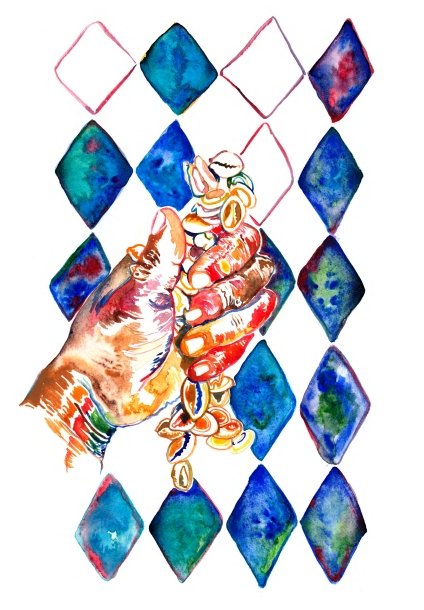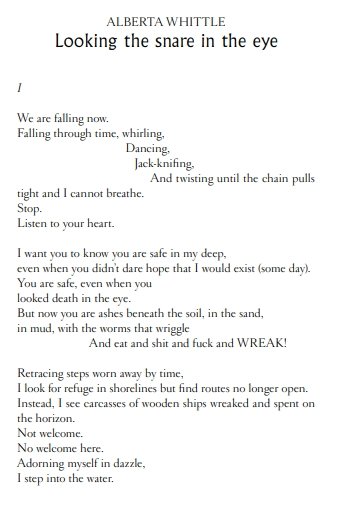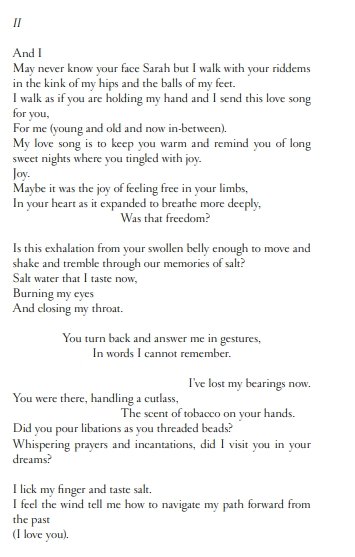The choir is waiting at the threshold, deep dive (pause) uncoiling memory, 2022, Installation Shot. Photographer Cristiano Corte, © Alberta Whittle.
“It's all too easy to become apathetic and numb to all of the parallel histories being re-lived in our world today so I want my work to take that apathy and numbness and provide a space for people to feel.”
Alberta Whittle, 2022
deep dive (pause) uncoiling memory is an exhibition by artist Alberta Whittle commissioned on the occasion of the 59th International Art Exhibition – La Biennale di Venezia, by the Scotland + Venice partnership. In an installation of work comprising tapestry, film and sculpture, and spanning two rooms in a former boatyard, Whittle encourages us to slow down, in order that we may collectively and critically consider the historic legacies and contemporary expressions of racism, colonialism and migration, and begin to think outside of these damaging frameworks.
Click the below link for a publication including texts by Eddie Chambers, Dr Cheryl Finley, Dr Nat Raha and Alberta Whittle which investigate and reveal the ideas and concerns within Whittle’s practice and exhibition.
In this short film, Alberta Whittle takes us behind the scenes of deep dive (pause) uncoiling memory, exploring the themes and providing insights into her process.
Extract of pages 16 to 18 from deep dive (pause) uncoiling memory publication.
“The title of this work [the deep dive (pause) uncoiling memory installation], it’s got that very deliberate pause, and that pause is there to encourage us to settle… to settle into this state where we can really think, what have we forgotten? And so, by looking at memory, and actually almost using memory studies as a way to encourage this process of unlearning, I think we can really start to band together and think about change and encouraging different voices, intervening into what we understand of as history.”
Alberta Whittle, 2022
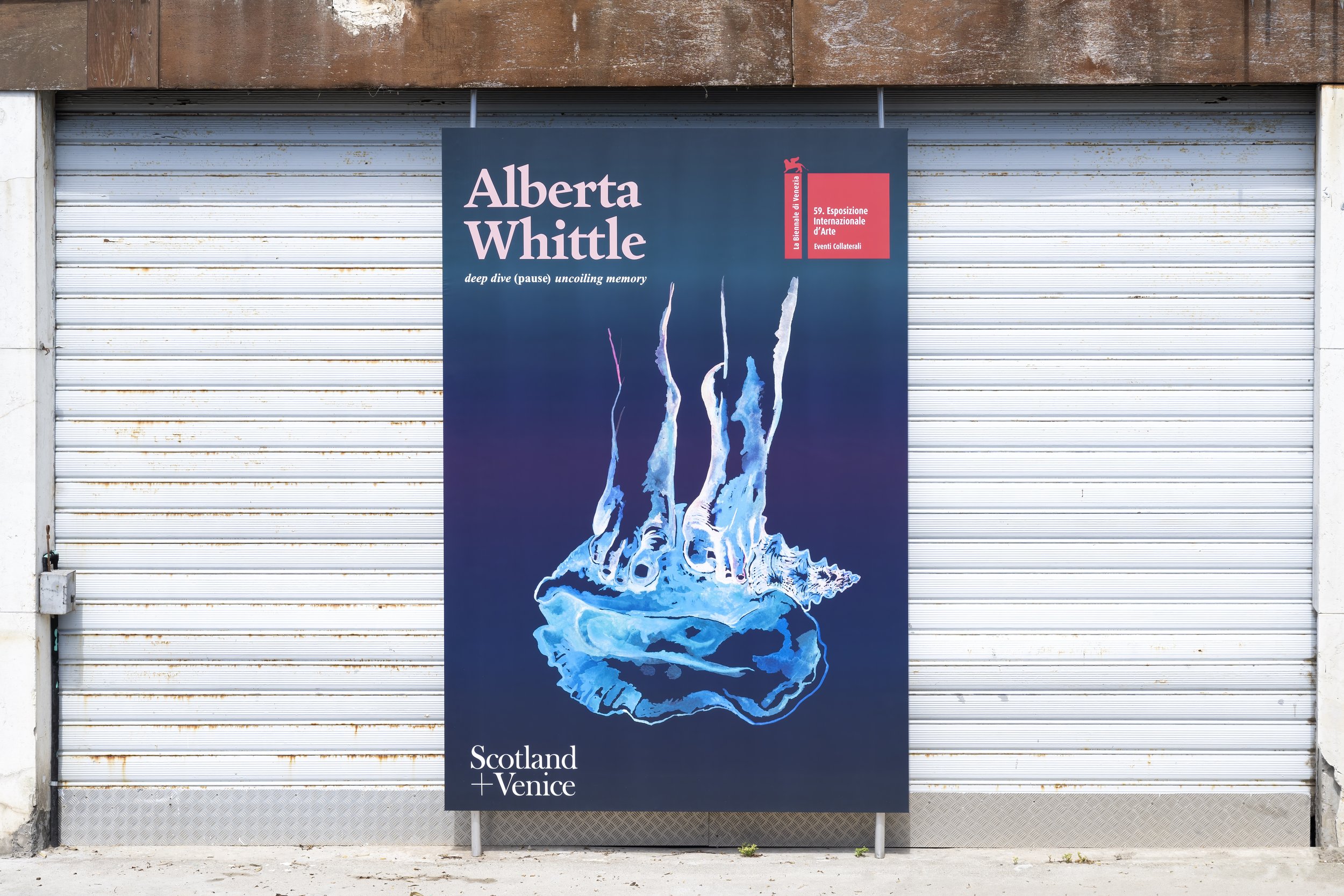
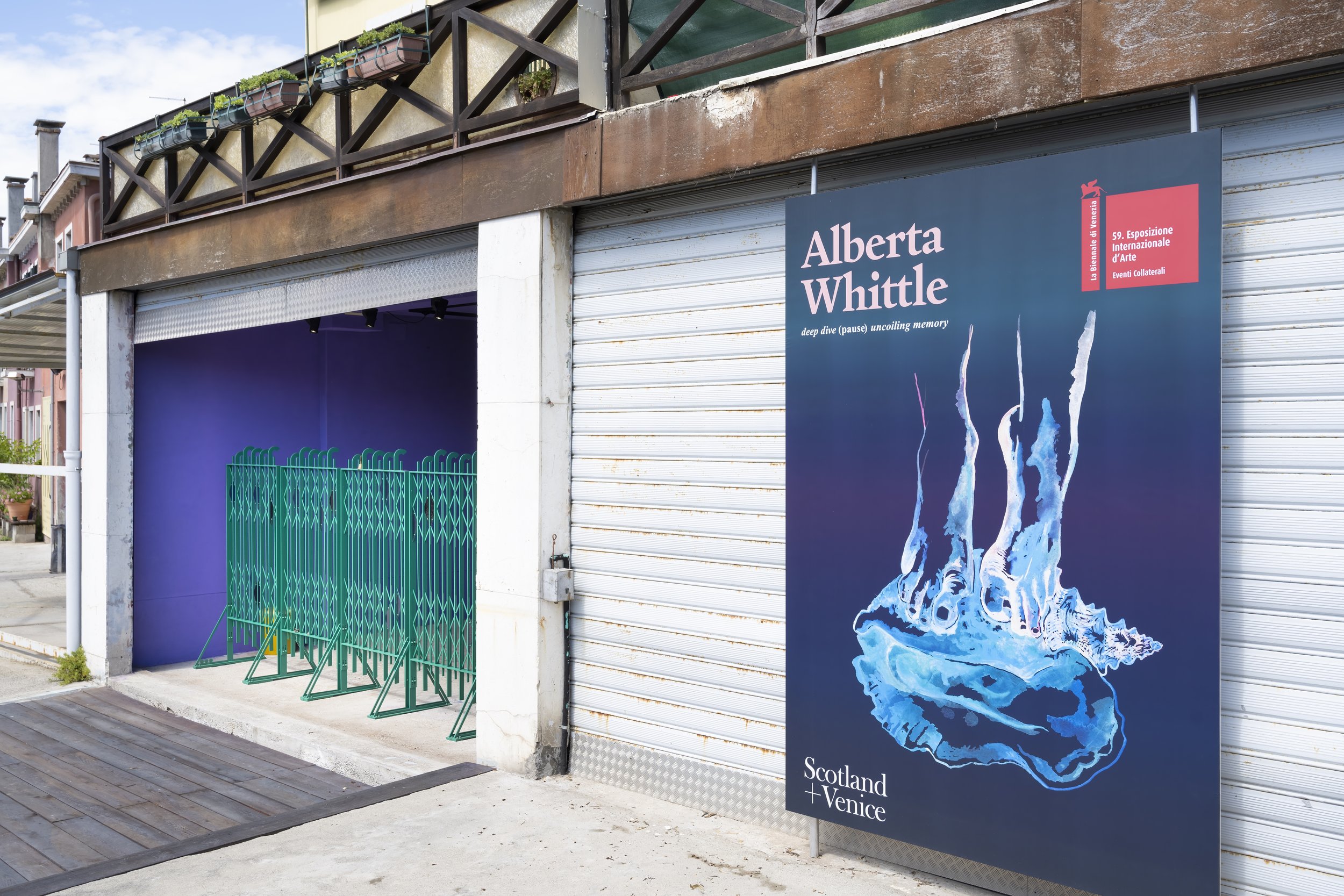
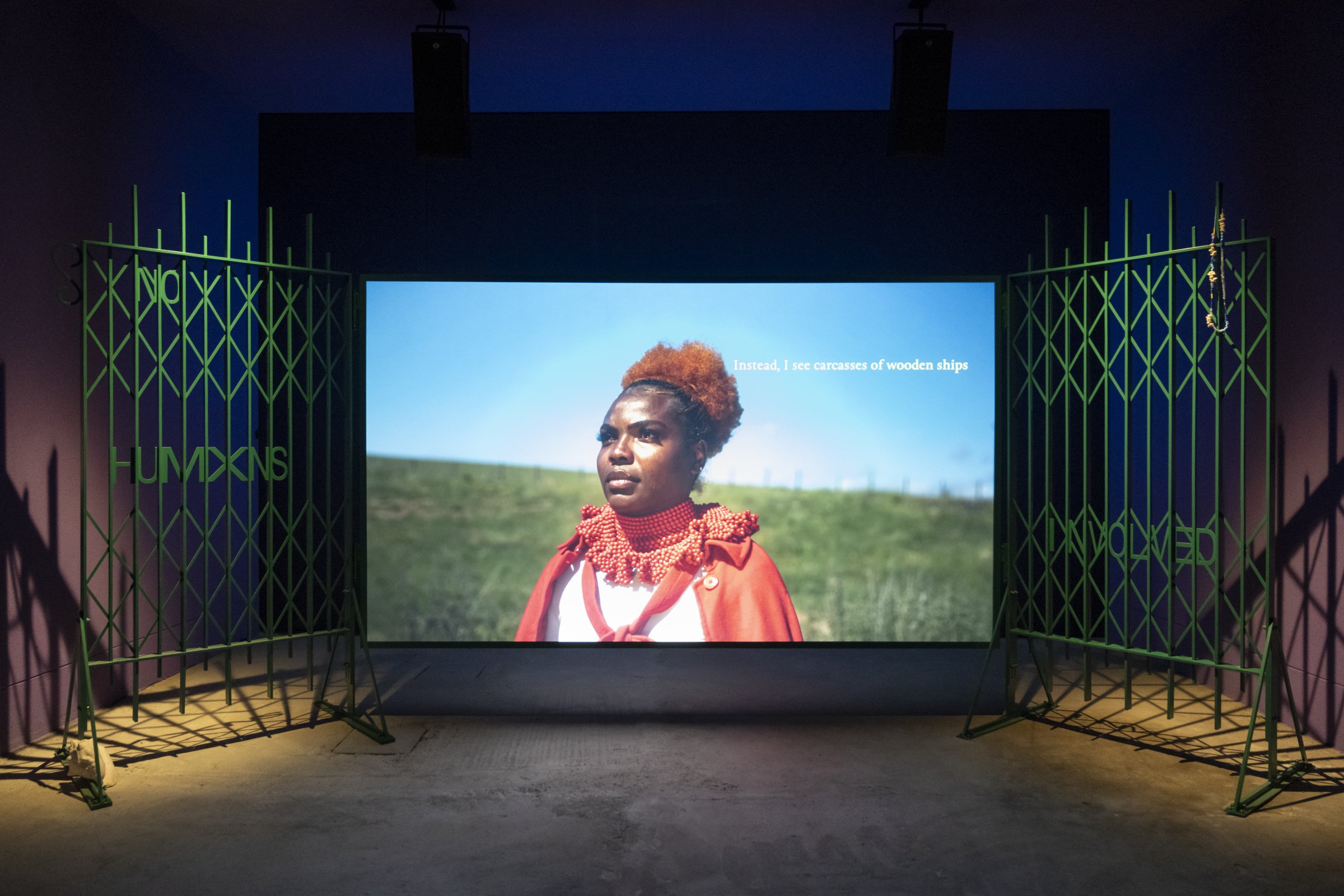
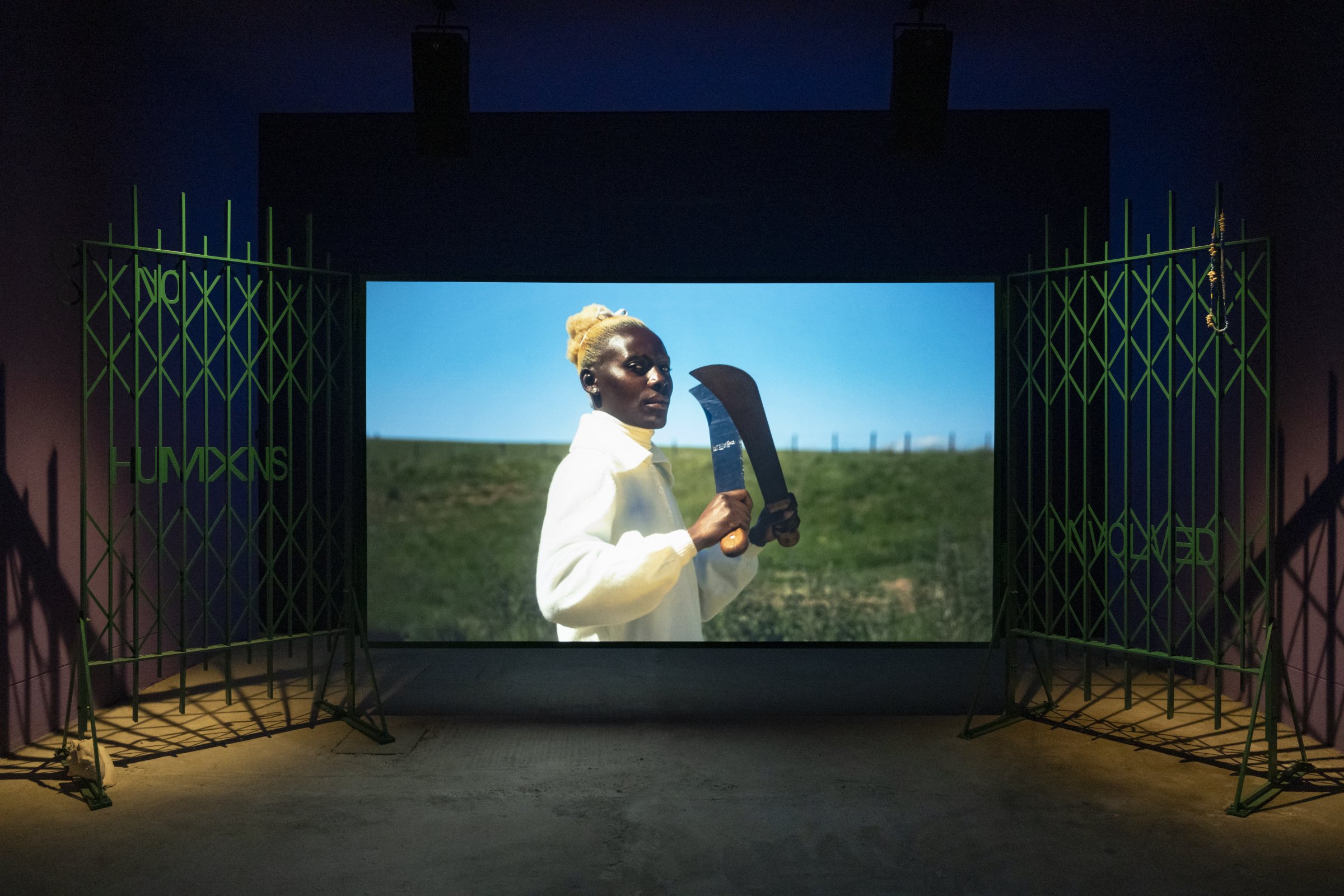
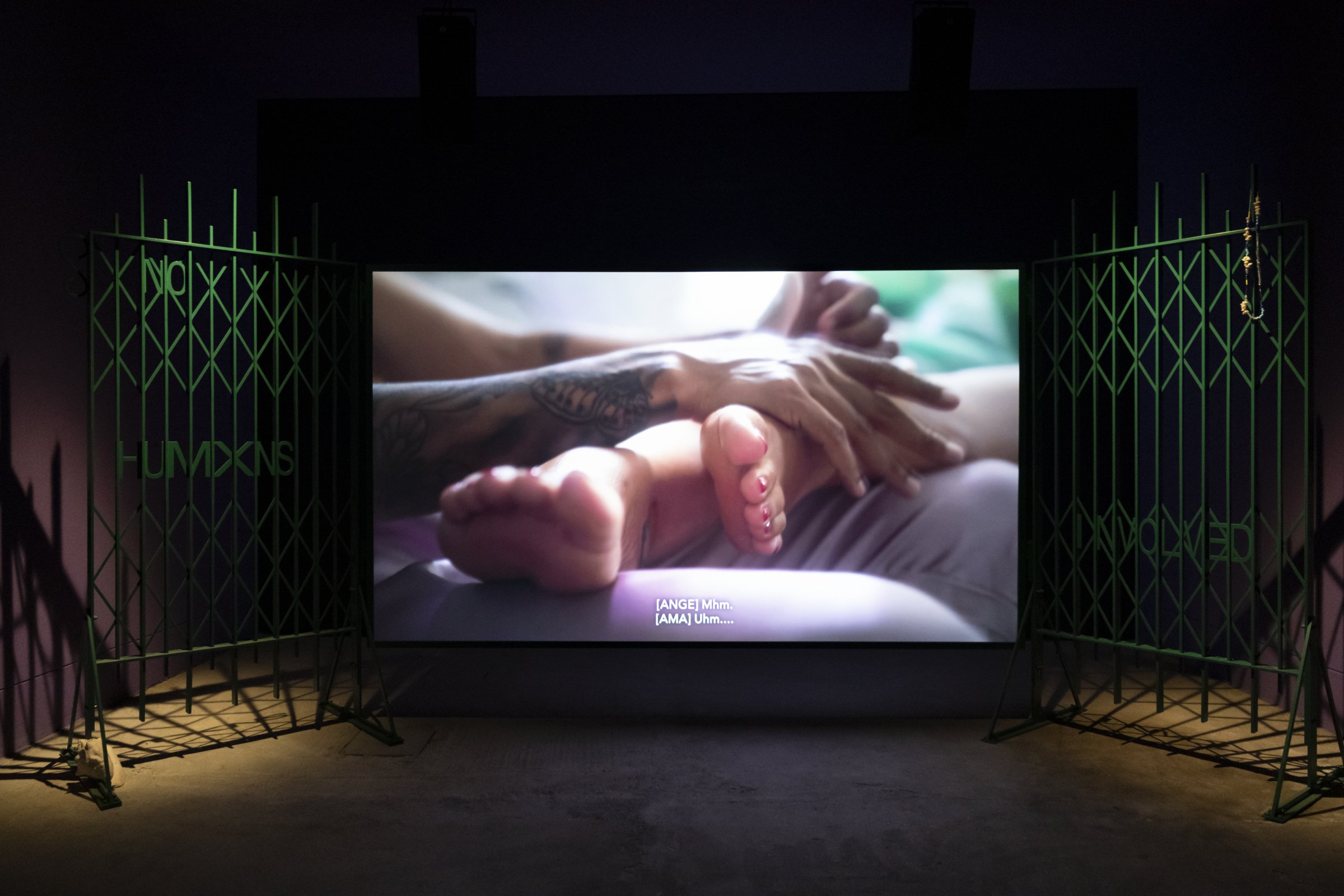
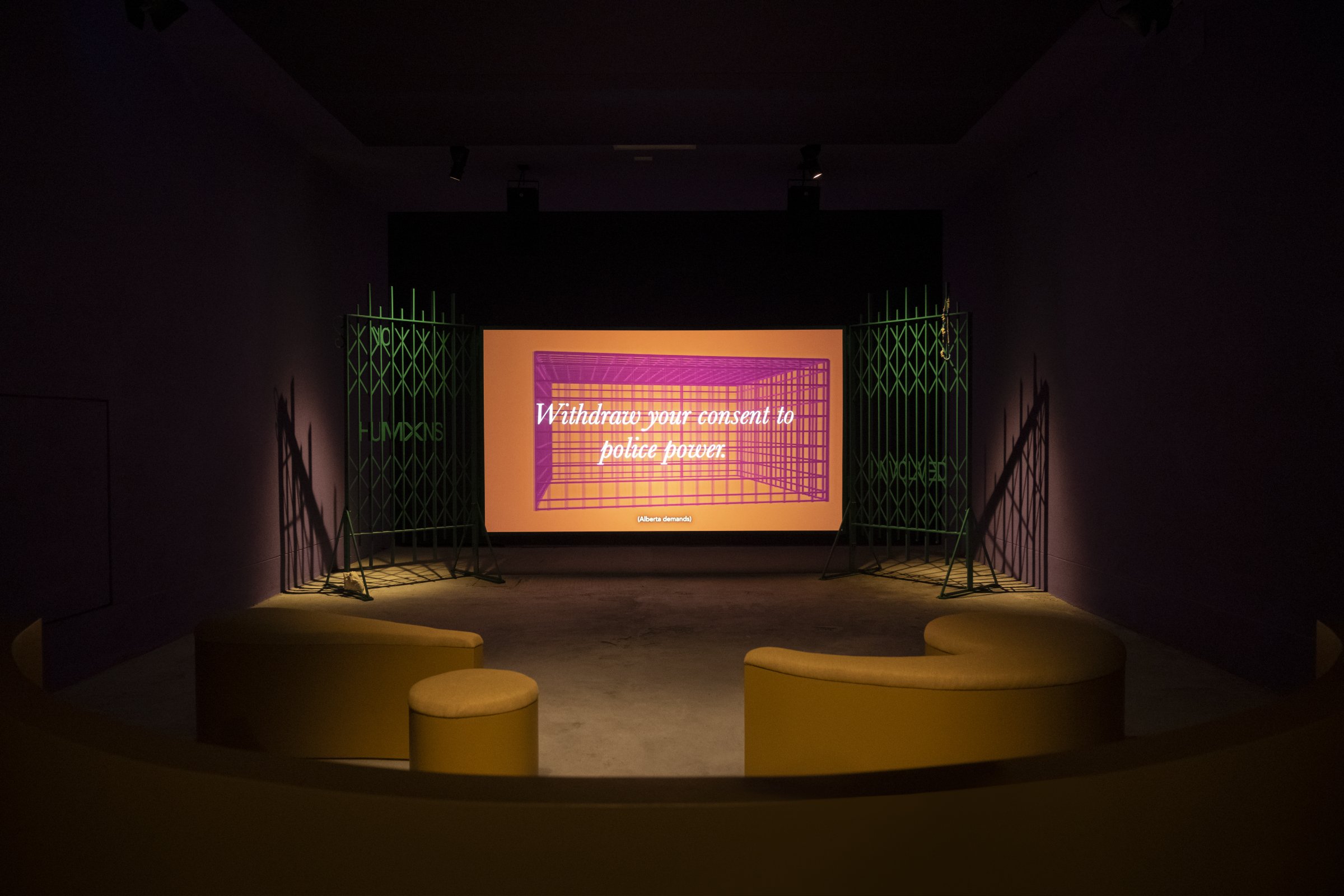
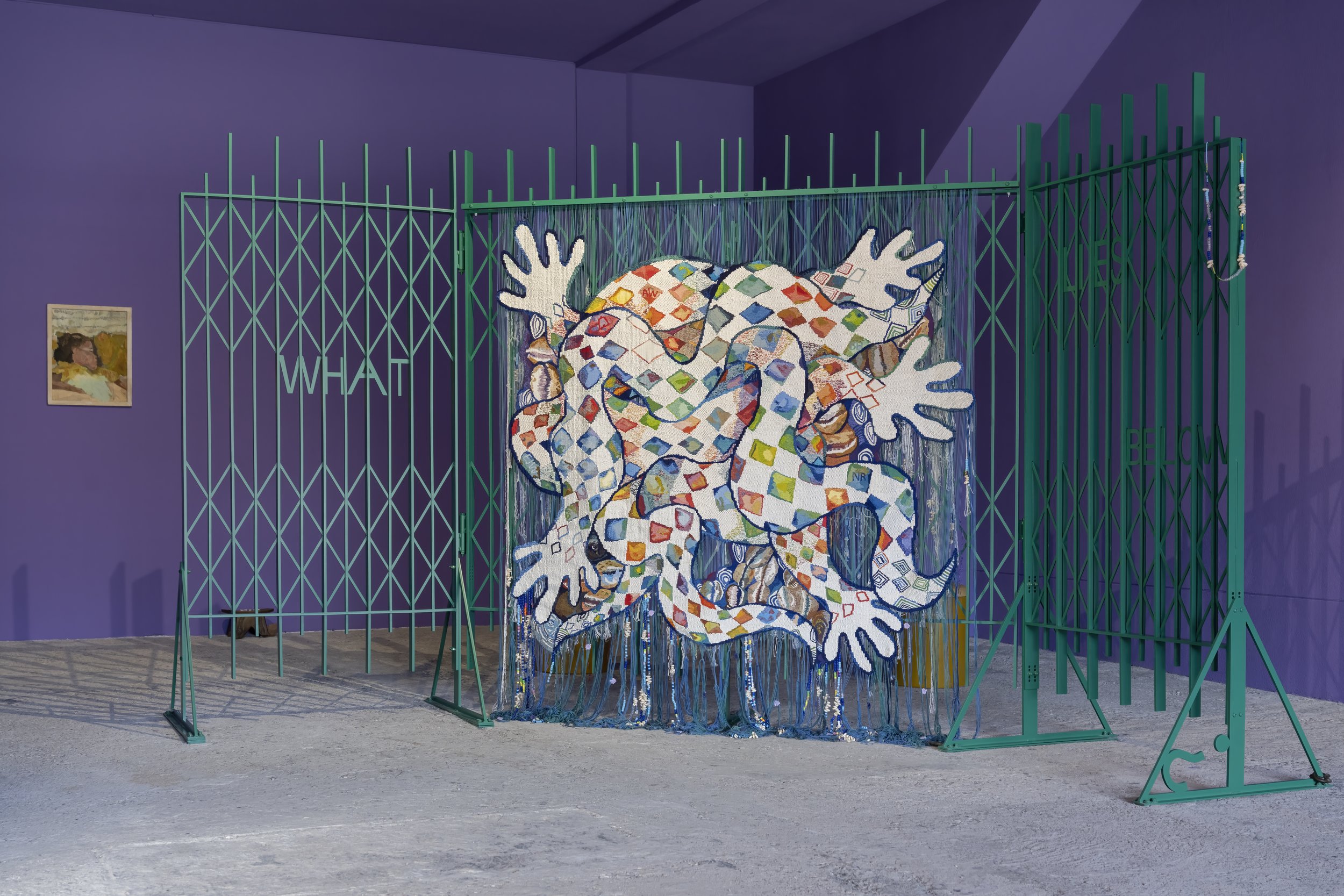
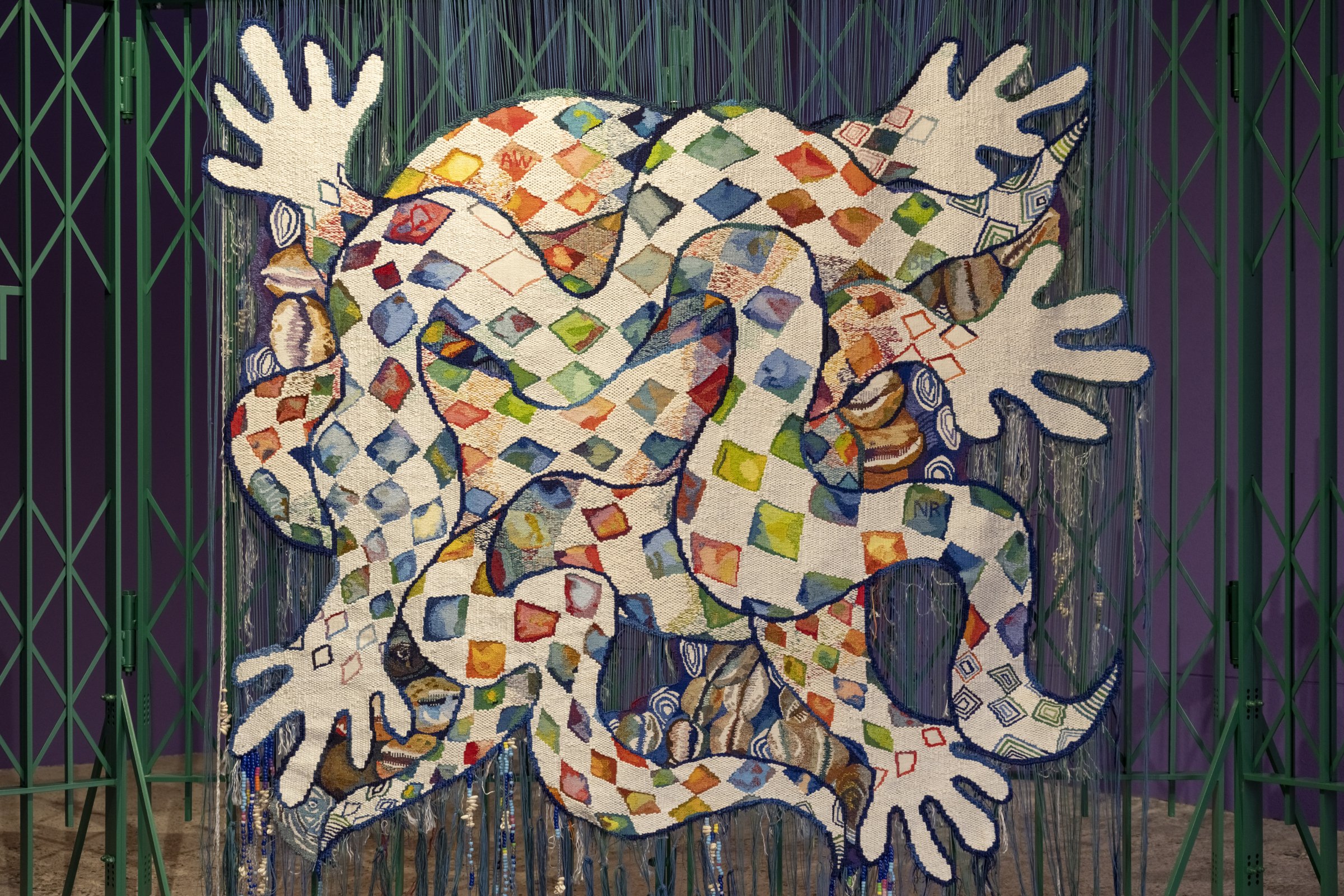
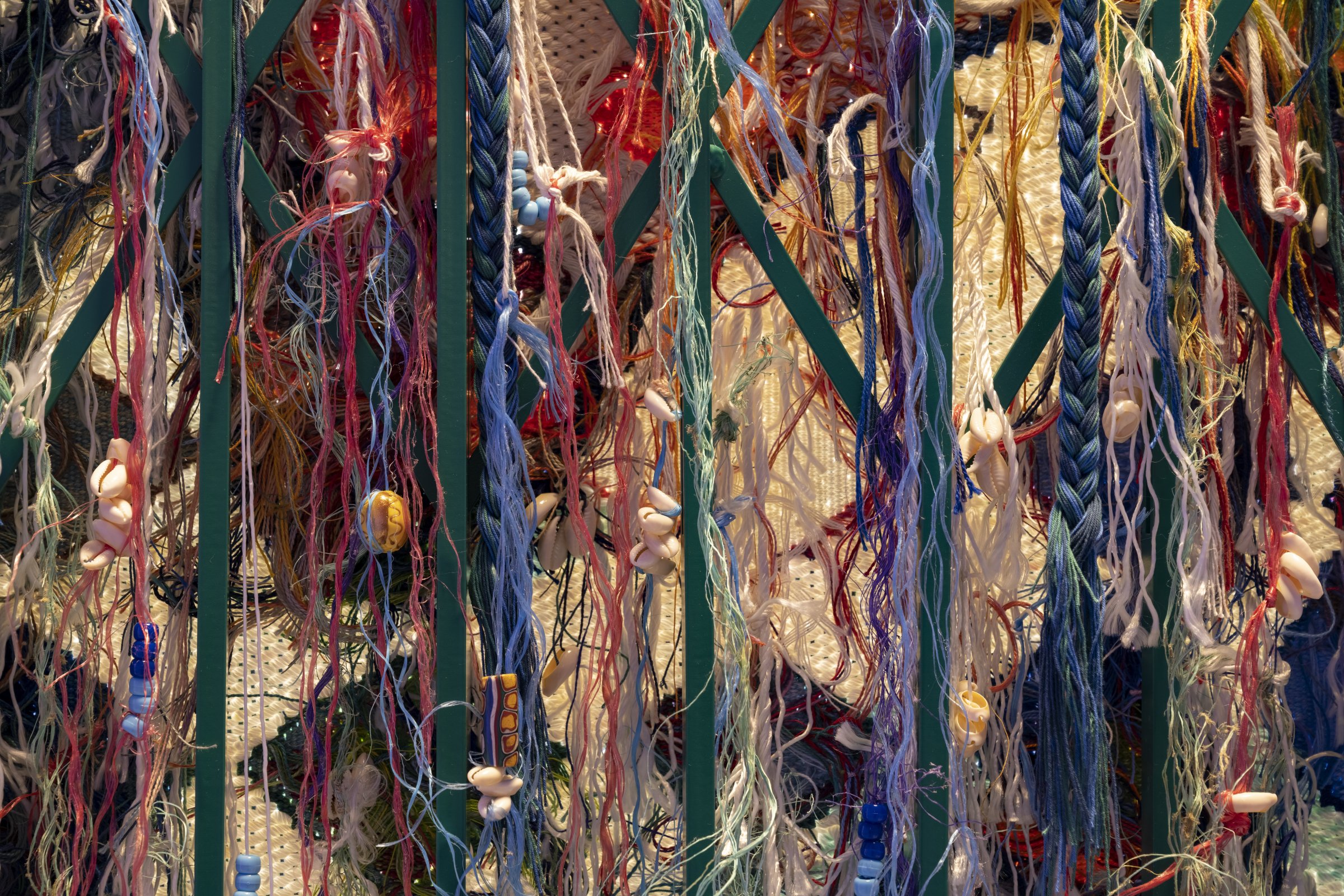
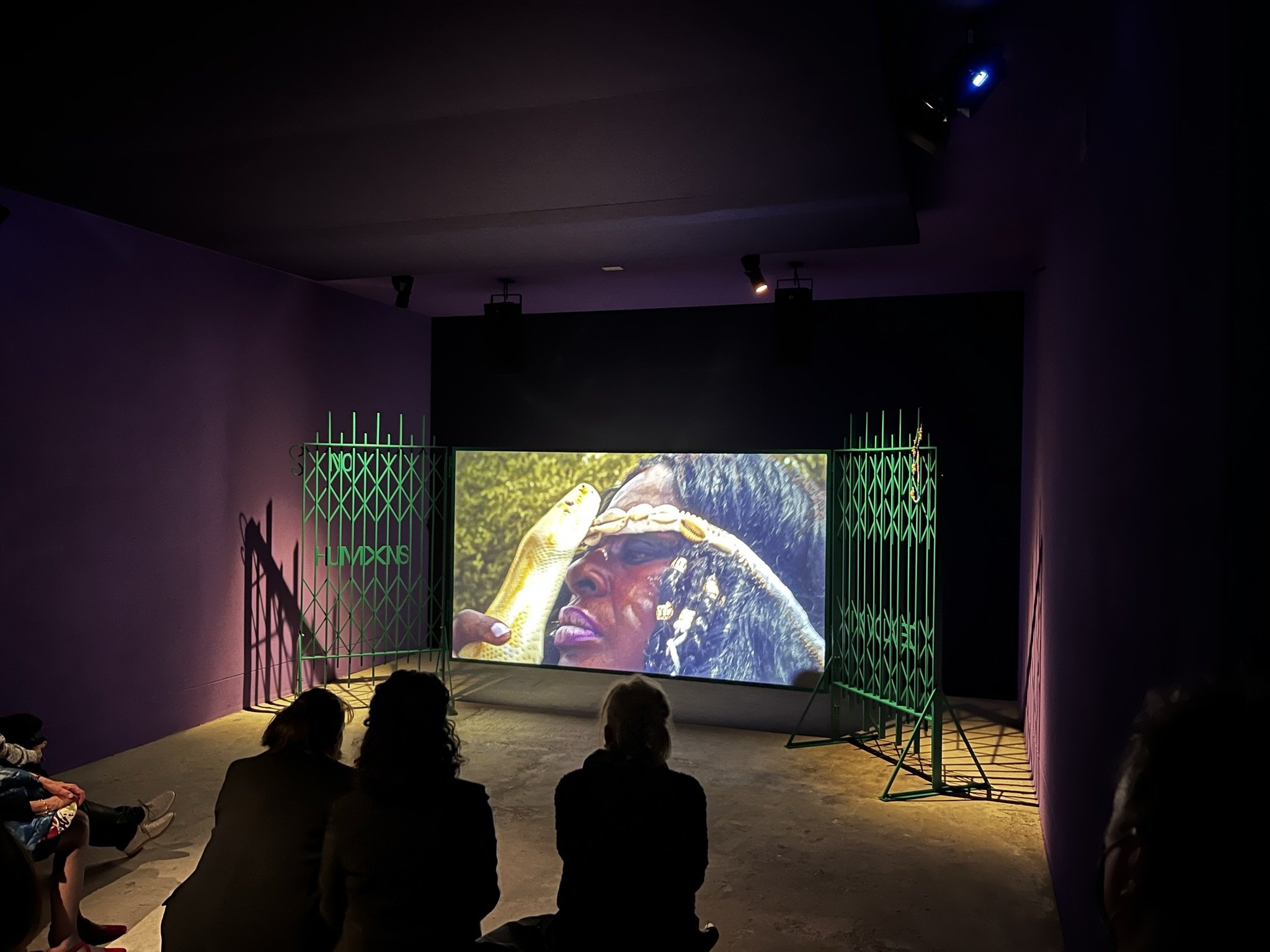
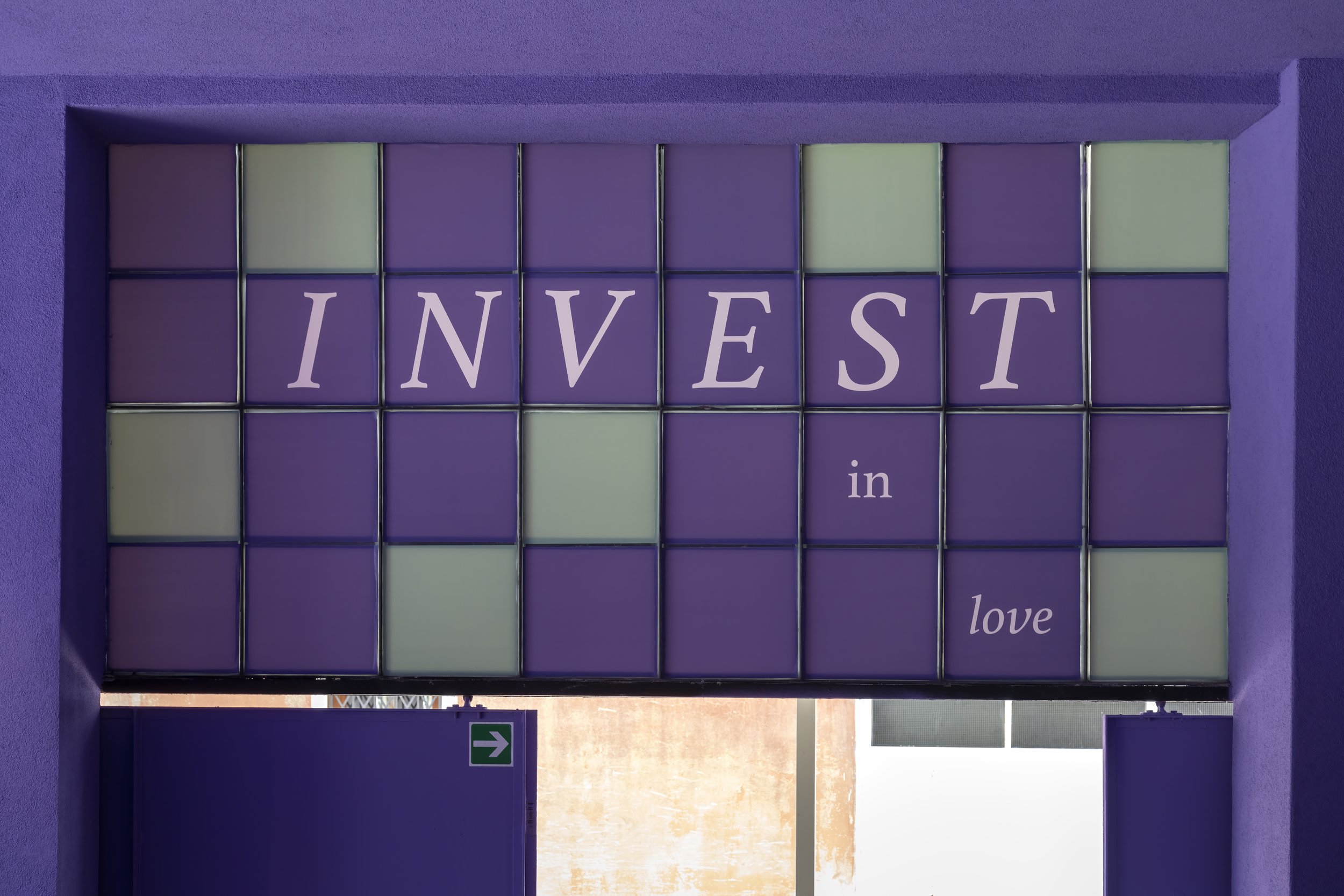
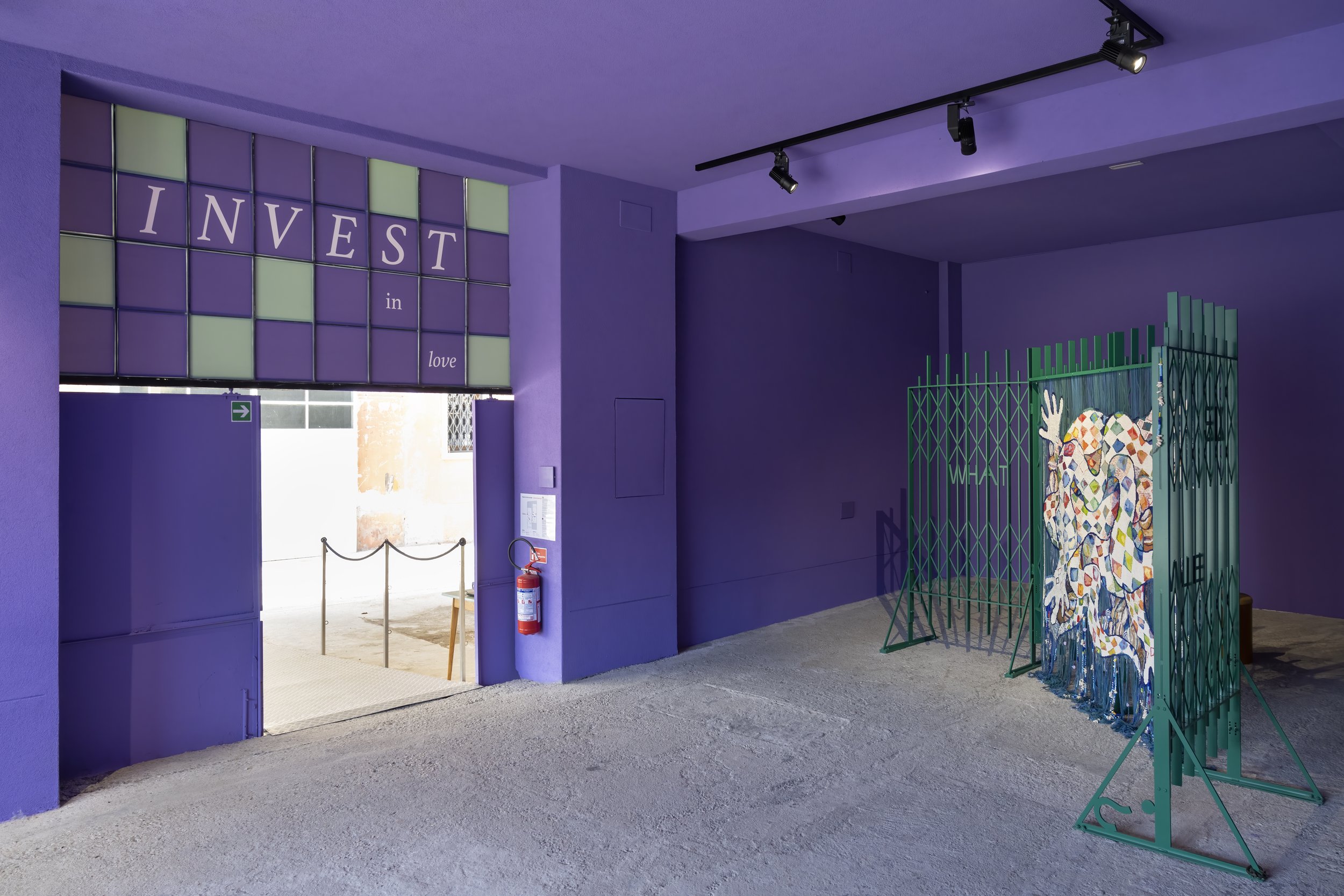
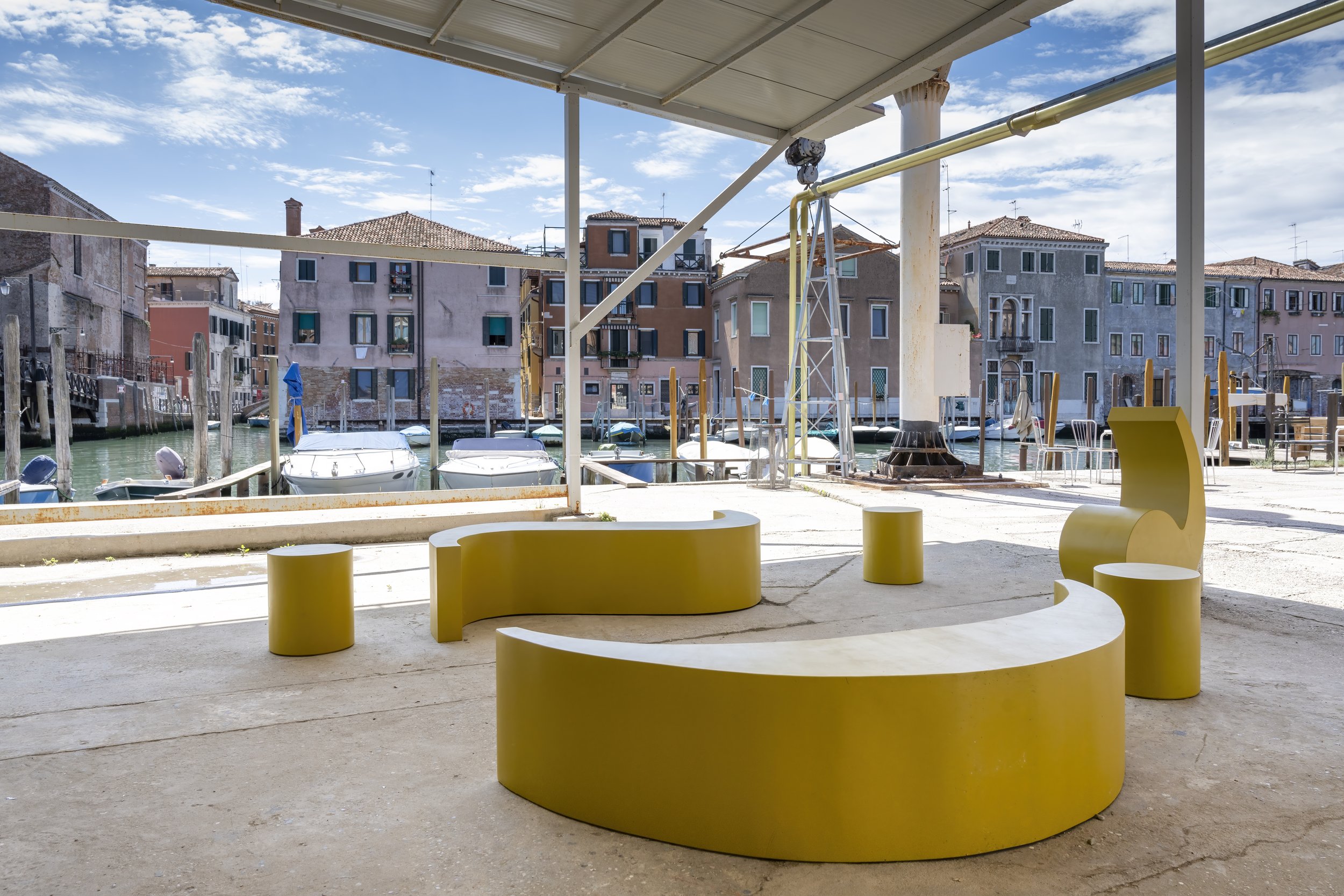
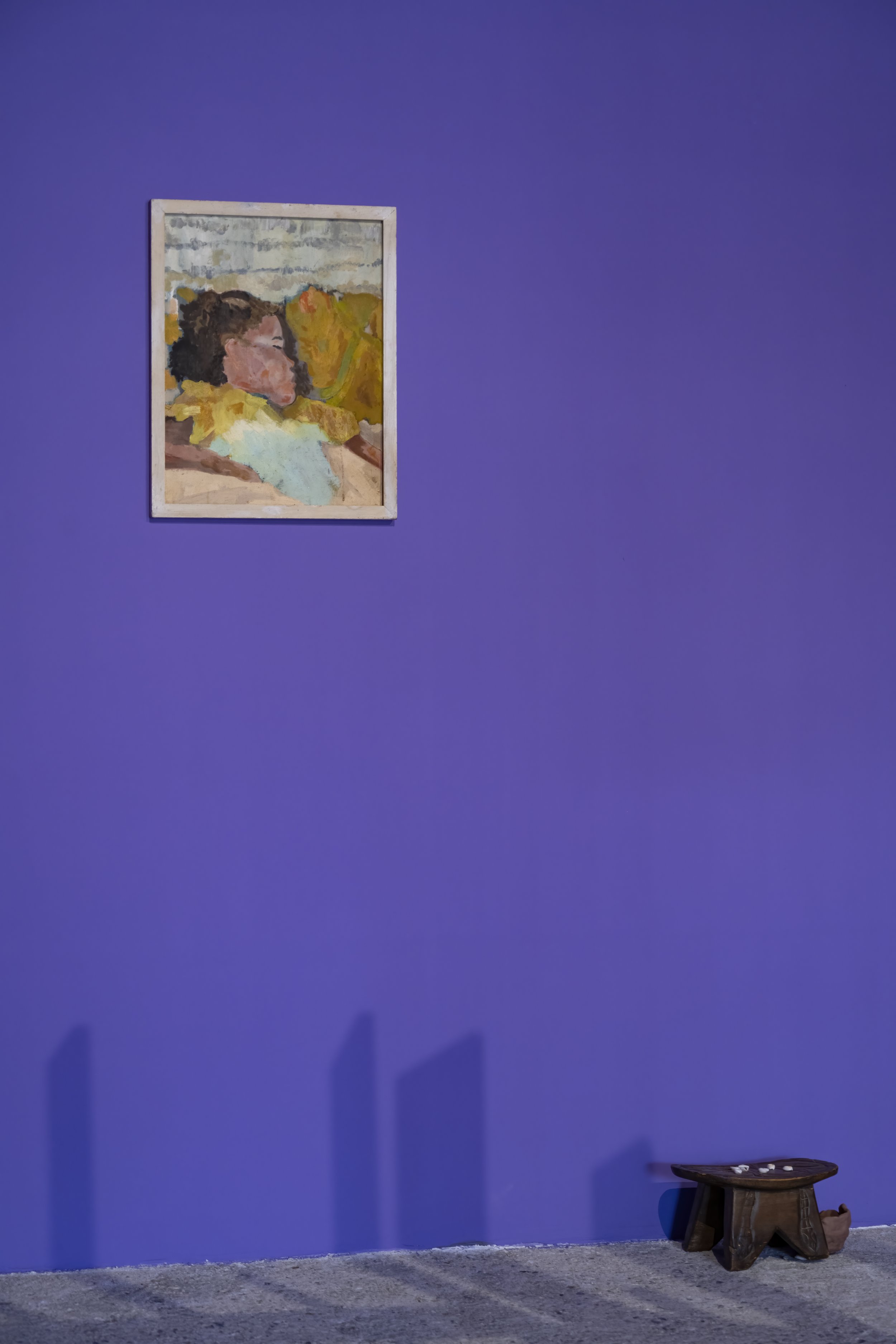
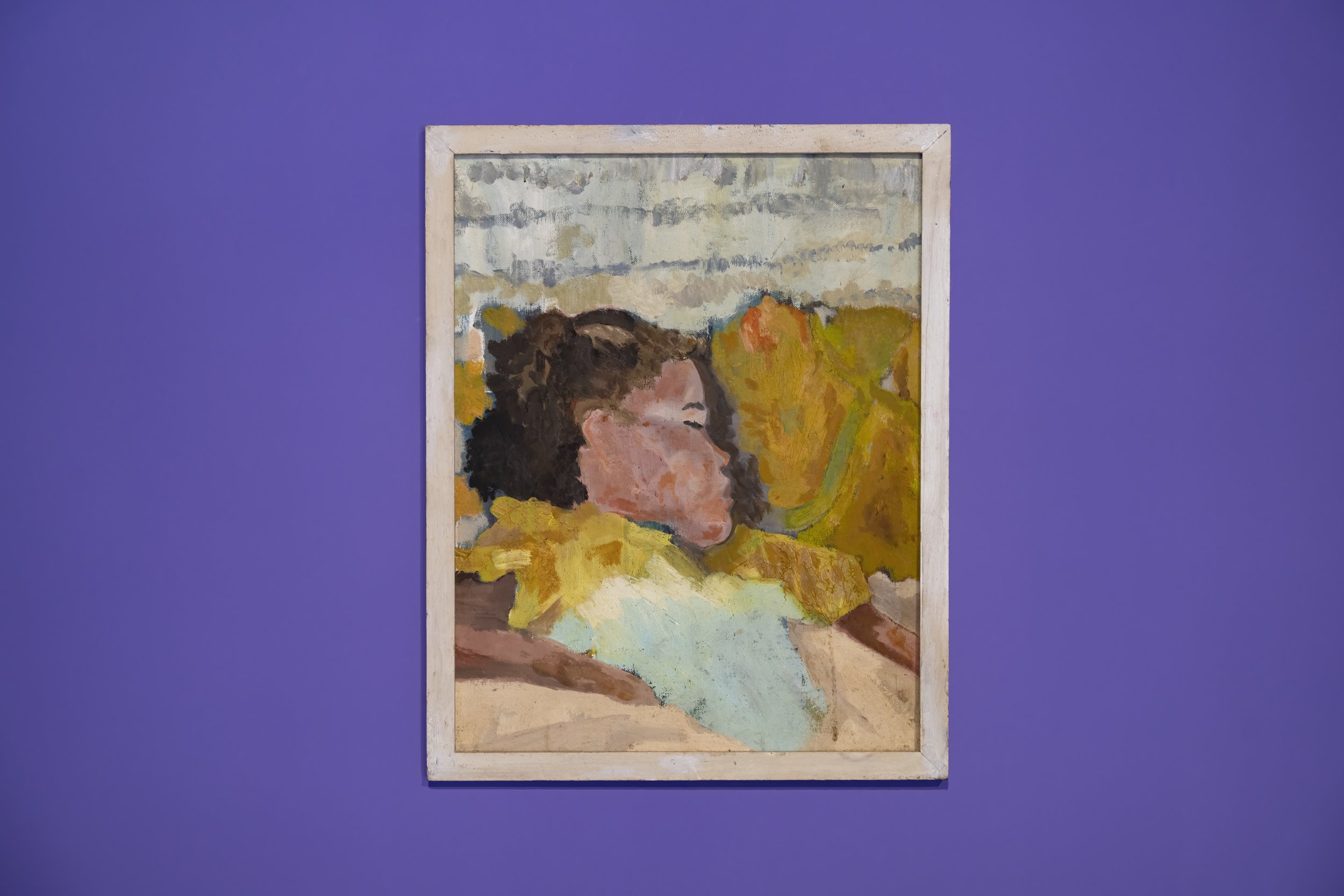
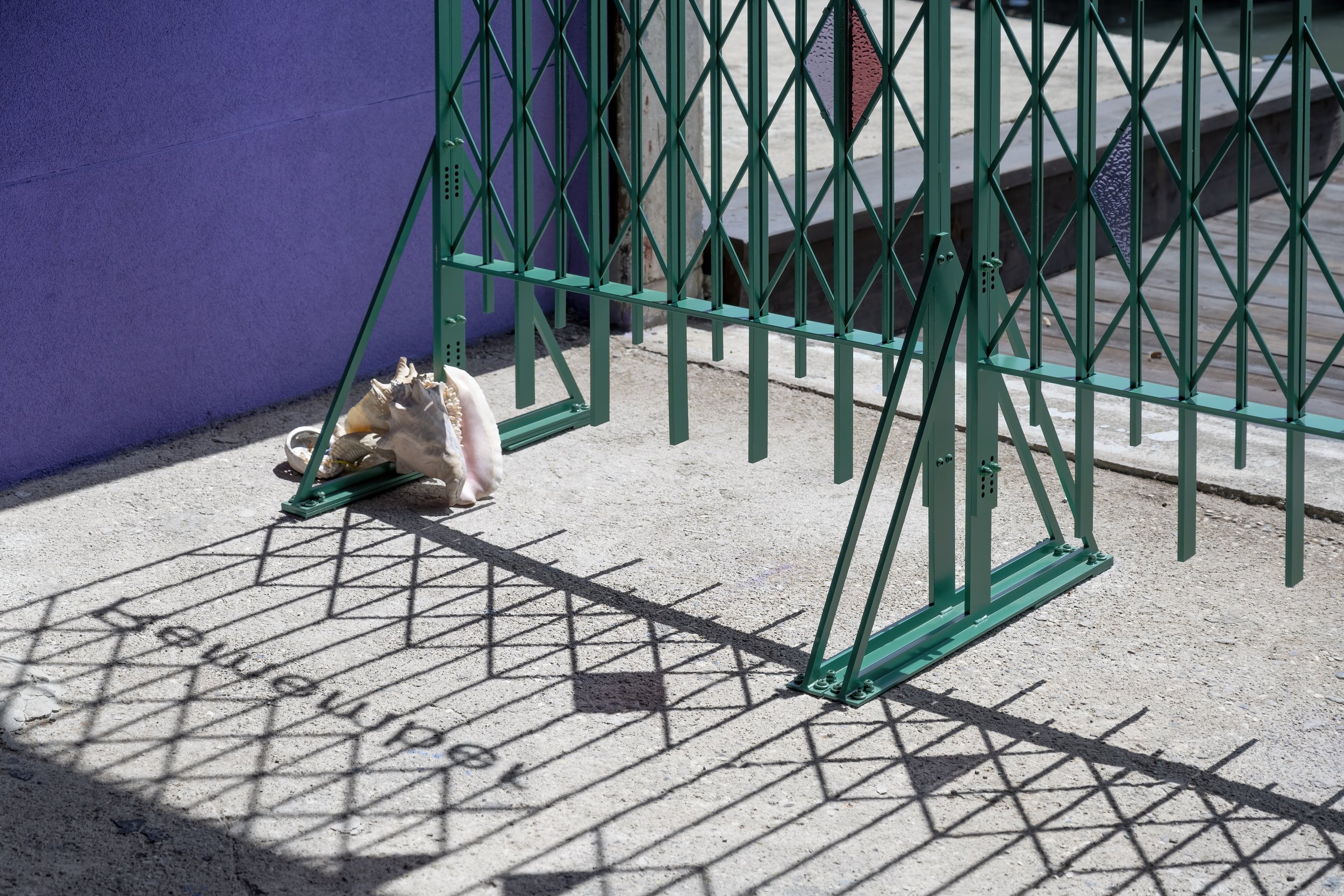
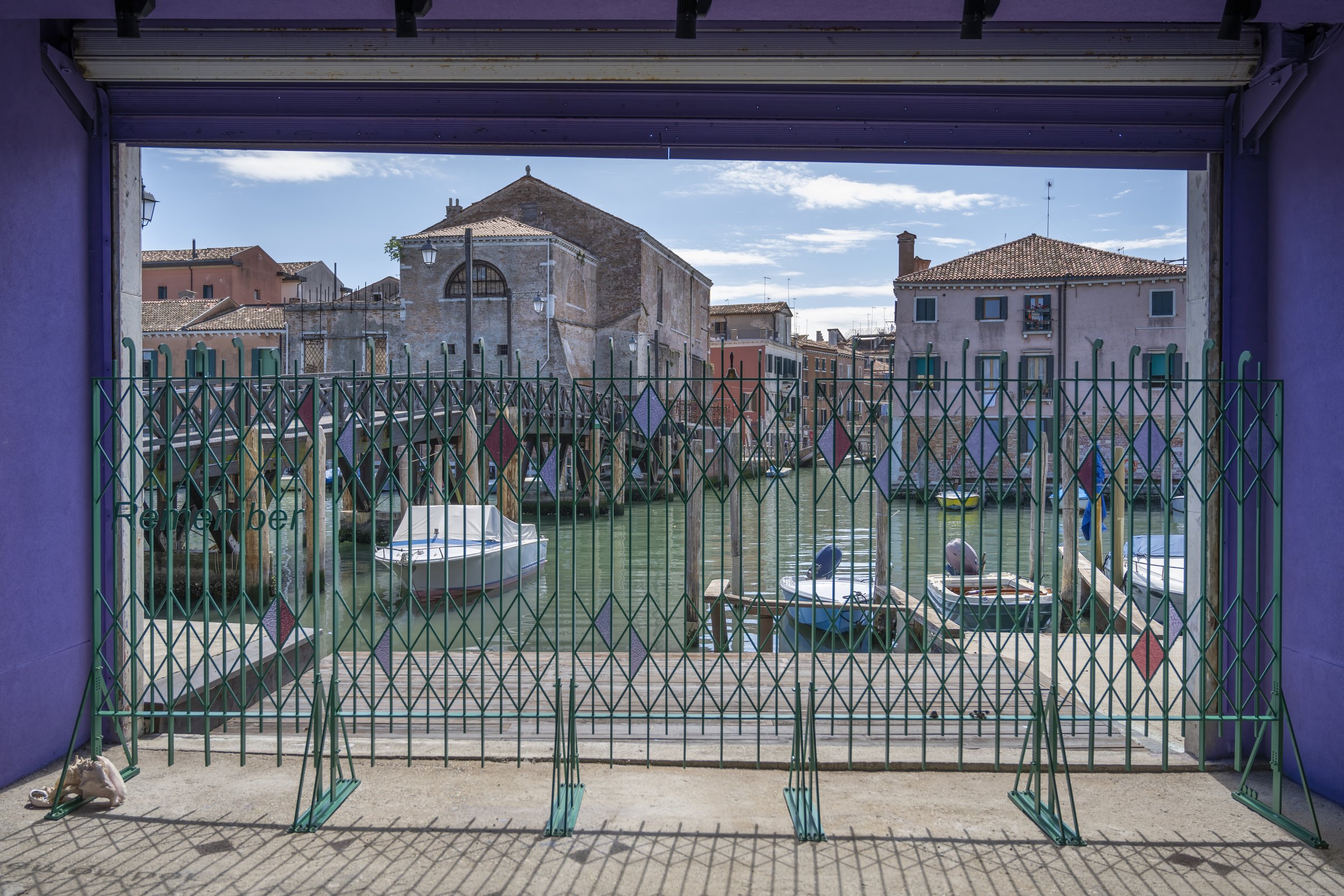
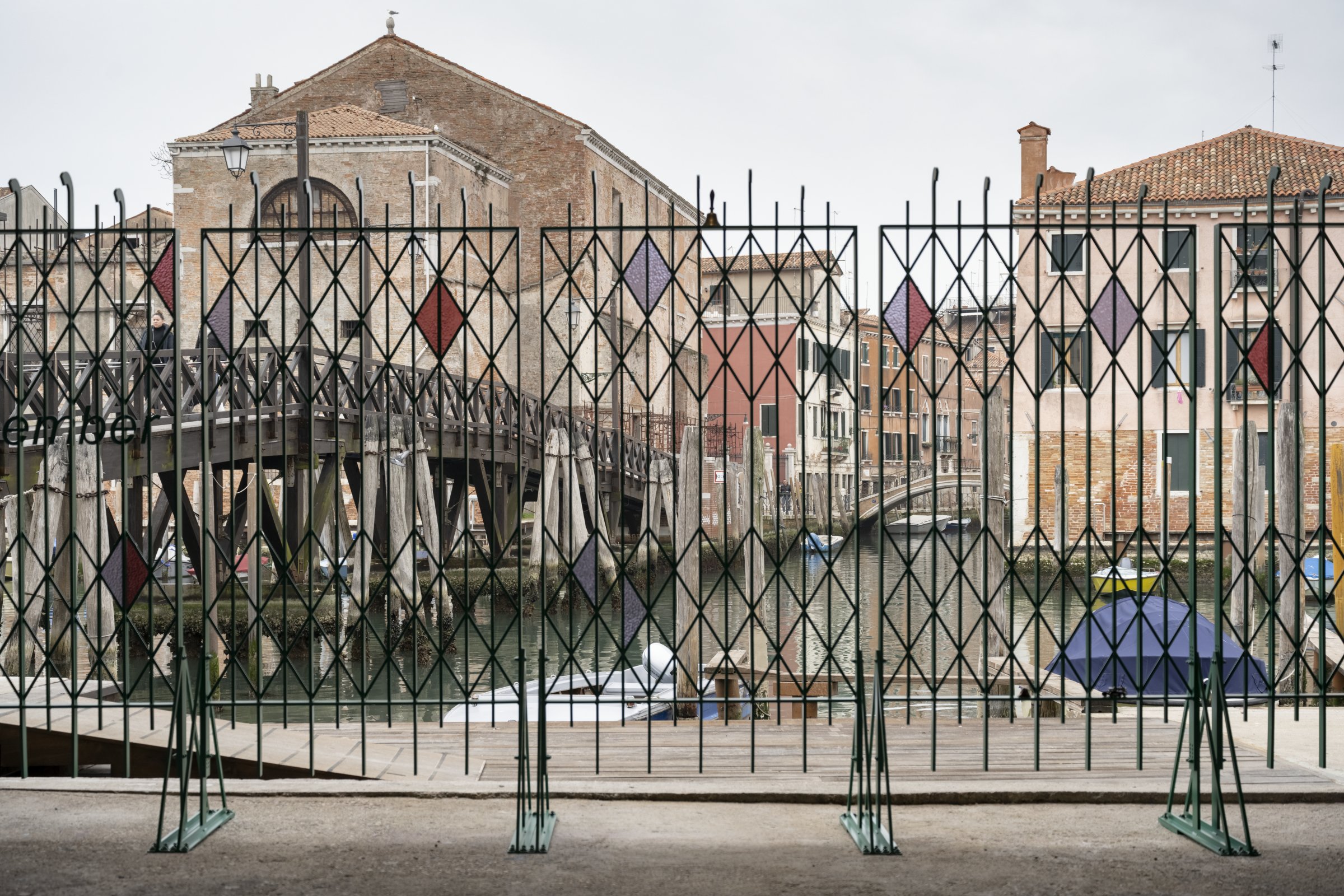
deep dive (pause) uncoiling memory, 2022.
Courtesy of the artist, Scotland + Venice and The Modern Institute/ Toby Webster Ltd., Glasgow. Photographer Cristiano Corte
Alberta Whittle discusses deep dive (pause) uncoiling memory with Veronica Simpson in the following interview:
Alberta Whittle’s creative practice is motivated by the desire to manifest self-compassion and collective care as key methods in battling anti-Blackness. She choreographs interactive installations, using film, sculpture and performance as site-specific artworks in public and private spaces. Whittle’s work is often made in response to current events and draws on her research into the African diaspora and the decolonisation of Western histories, with major themes in her work including colonialism, xenophobia and climate change. Her practice builds on ideas of the Caribbean Gothic and Hauntology, embracing storytelling to explore ideas of displacement and kinship, with the desire to cultivate hope and personal healing as a form of resistance against a background of catastrophe.
An in-depth analysis around the themes explored in Alberta Whittle’s work are explored and commented on by Kate M. Wilcox, a participant in this year’s Professional Development Programme, a programme that see’s students and early career practitioners from universities, colleges and arts organisations across Scotland gain invaluable experience of invigilating an international art exhibition. The link below is an extract that has been taken from Invest in Love: Decolonial, Feminist, and Queer Curatorial Approaches in deep dive (pause) uncoiling memory, a dissertation submitted for the Degree of MLitt Museum and Gallery Studies at the University of St Andrews by Kate M. Wilcox:
Why artist Alberta Whittle is imploring us to ‘invest in love’
In an interview conducted by Emily Dinsdale from DAZED, Alberta Whittle discusses how her work reiterates themes of love. Click the link below for the full interview.
Alberta Whittle unravels Venice’s often troubling relationship with Blackness
Alberta Whittle’s work at La Biennale di Venezia looks at how anti-racism can proactively address racial trauma as well as interrogate the histories of countries and cities such as Venice for their roles in global trade, colonialism and slavery. Louisa Buck from the Art Newspaper recently held a conversation with VIAD Research Associate Alberta Whittle, around these issues.
Professional Development Program
Shalom Mushwana is a student at the University of Johannesburg and is in the process of completing his Honours in Fine Art. Shalom participated in this year’s Scotland + Venice Professional Development Programme which provides opportunities for students and early career practitioners to work at the Scottish venue in Venice. Shalom’s involvement was an exciting and new collaboration between Scotland + Venice and the University of Johannesburg. Shalom travelled to Venice in October 2022 for four weeks to work alongside other participants from across Scotland to gain invaluable experience of invigilating and visiting an international art exhibition. Ahead of his travels he spent some time (albeit remotely) with the artist and other participants hearing first-hand about the production techniques employed by Whittle and production partners and unpack the themes explored in the work.
OUR HISTORY IS A BLESSING AND A CURSE
SHALOM MUSHWANA
My name is Shalom Mushwana. I come from Makhanda in the Eastern Cape, South Africa, and I am an honours student in Visual Art at the University of Johannesburg. Recently I was afforded the opportunity to take part in the Professional Development Programme, which is run by Scotland+Venice. It introduces post-graduates to a professional working environment at the Venice Biennale.
The aim of the programme is for young scholars to build networks with people, especially artists, involved in the Biennale.
If I ever got this opportunity again, I would most definitely take it up. It was such an invaluable experience, being in Venice and meeting a strong network of international individuals working with Alberta. As an aspiring artist, it was a great personal experience too. I couldn’t have asked for anything more exciting, interesting, and engaging as this.
Some themes were difficult to deal with. As a non-Diasporic person who is Black and was born in South Africa, it’s heart-wrenching to hear Diasporic stories but I also felt an immediate relationship with Diasporic people, as I am a South African living in a divided nation regardless of being a supposed born-free. Especially in a ‘new’ South Africa that still has an archaic residue that sits below the surface. In many ways, there is a similar residue existing in Alberta’s work, where there are things that undulate beneath the surface and underneath the water. I often think of the sculptural gates that say, ‘What lies below?’. I think about the stories that are embedded on the surface of the ocean from the slave trade. It’s like untold stories and histories that lie underneath the sea. It’s a historical residue that is sometimes forgotten.
The Biennale has a very specific demographic. I would say 40+ year old heteronormative white couples. Black people are a minority amongst the visitors. Given this demographic, I experienced a lot of implicit racism. There’s an exoticising gaze where people stare at you and almost feel entitled to do so. It was good to hear some people be able to tell where I was from by how I speak. Someone would say ‘You have a very particular accent. Are you from South Africa?’ and I would say ‘Yes, how could you tell?’. I would think, do we, as South Africans really sound a particular way? I had a sense of foreign-ness. That’s how I viewed Alberta’s work. Being a foreign body in a foreign place. There’s a sense of not feeling settled and feeling like one cannot truly settle within a space but finding a gentle way to exist while still being critical. It meant having to be mindful of not being ignorant of one’s own history or Blackness within a specific amount of whiteness.
It’s always difficult to talk about violence against Black bodies. There’s often resistance to fully engage with acts of violence Sometimes, I found people had a desensitised attitude when talking about violence against Black bodies because it has been such a perpetuated narrative throughout our existence. This is something Alberta nailed – a considered and sensitive retelling of this narrative. Although she’s very sensitive to the trauma that Black bodies have been through, she doesn’t tell the stories in a re-traumatising way. When considering Alberta’s work, the history it refers to, and how it speaks to violence against Black bodies … there’s still something nurturing about it. There’s a tenderness and thoughtfulness towards the future for Black bodies and Black youth, and especially with how we could exist in the world.
Through this experience in Venice, I’ve learnt be brave and not be bound by the conventions of the South African art world. Technically, people shouldn’t be bound by anything, especially because we, in South Africa, have such a progressive way of making art. I think it’s more engaging than the western way of making. When I came back, I thought: ‘we’re actually quite strong as artists here in South Africa’. We’re very special and we have such a unique history. Coming back made me more cognizant of how important it is to draw on our own histories and to re-narrate them. It’s also important to find ways to share these undulating stories about ourselves and where we come from. There’s a great deal to talk about, although these are never easy conversations.
Our history is a blessing and a curse.
Alberta Whittle, Lagareh – The Last Born, (film still – single channel video), 2022, Photographer Jaryd Niles-Morris, © Alberta Whittle. Courtesy the artist, Scotland+Venice, and Forma.
Alberta Whittle’s film Lagareh: The Last Born – a film that is a part of her larger work deep dive (pause) uncoiling memory – focuses on Scotland’s historical links to the transatlantic slave trade and highlights the strength of contemporary Black womxn in Europe, West Africa and the Caribbean. These geographical areas formed a ‘triangular route’ during the colonial era. Viewers of the film can reflect on the traumatic legacy of slavery and its potential impact on policing and incarceration today. The film will be touring to six different venues including The Bioscope Independent Cinema in Johannesburg.
See below link to view the trailer of the film Lagareh: The Last Born
Camara Taylor is an artist living in Glasgow. Working with their various selves, collaborators and organisations, they make still and moving images, texts, exhibitions among other things. Projects tend towards recalcitrance, ambivalence and low frequency objections found in the silt, slop and snap. Camara Taylor was commissioned by Scotland + Venice to write a short text in response to Alberta’s new film, Lagareh - The Last Born. Broken into seven parts, Taylor’s text ‘mind how you go’ unravels ideas, thoughts and forms of questioning around abolition and ancestry, made apparent in the now, in the then, and in Scotland.
Alberta Whittle, Lagareh – The Last Born, (film still – single channel video), 2022.
Photographer Matthew Arthur Williams, © Alberta Whittle. Courtesy the artist, Scotland+Venice, and Forma.
View Alberta Whittle’s short poem with reference to her film below:
On the 11th and the 18th of November 2022, VIAD hosted an independent screening of Alberta Whittle’s film Lagareh – The Last Born at the Bioscope. These screenings were successful gatherings that were incredibly thought provoking and left the audience in a space of stunned silence. More screenings of Alberta’s film will be taking place into 2023 and are listed below.
UK Premiere and Scottish cinema tour for Alberta Whittle's film Lagareh - The Last Born
Scotland + Venice and LUX Scotland are delighted to announce the UK Premiere and Scottish cinema tour of Alberta Whittle’s new film, Lagareh – The Last Born, at venues across Scotland between September 2022 and March 2023.
Commissioned by Scotland + Venice and Forma, the film’s Scottish screenings in Glasgow (Glasgow Film Theatre, Tuesday 20 September), Inverness (Eden Court, October), Lerwick (Mareel, November), Aberdeen (venue tbc January 2023), Skye (Broadford Town Hall, February 2023) and Ayr (Ayr Town Hall, March 2023), will take place simultaneous to its presentation as part of Whittle’s critically acclaimed current exhibition, deep dive (pause) uncoiling memory, at the 59th International Art Exhibition - La Biennale di Venezia, showing there until November 2022.
The Scottish cinema tour is programmed by LUX Scotland with support from Art Fund.
Read full details of the tour:
Alberta Whittle, Lagareh – The Last Born, (film still – single channel video), 2022.
Photographer Matthew Arthur Williams, © Alberta Whittle. Courtesy the artist, Scotland+Venice, and Forma.
Alberta Whittle
– The exhibition deep dive (pause) uncoiling memory is commissioned on the occasion of the 59th International Art Exhibition - La Biennale di Venezia, by the Scotland + Venice partnership with funding support from the National Lottery through Creative Scotland.
– Scotland + Venice is a partnership between Creative Scotland, British Council Scotland, National Galleries Scotland, Architecture & Design Scotland, V&A Dundee and the Scottish Government.
– The 2022 Scotland + Venice presentation is a multi-partner project commissioned by Scotland + Venice, initiated by Glasgow International and supported by Glasgow Life through Tramway.
– The film Lagareh was co-commissioned and produced by Forma Arts, London.
– The tapestry was co-commissioned and produced by Dovecot Studios, Edinburgh.
– Creative Partners in the project include: Art Night, Glasgow Sculpture Studios and the Visual Identities in Art and Design Research Centre (VIAD), University of Johannesburg.
– The project and exhibition was supported by funding from: British Council Scotland, The Elephant Trust and the Henry Moore Foundation.



